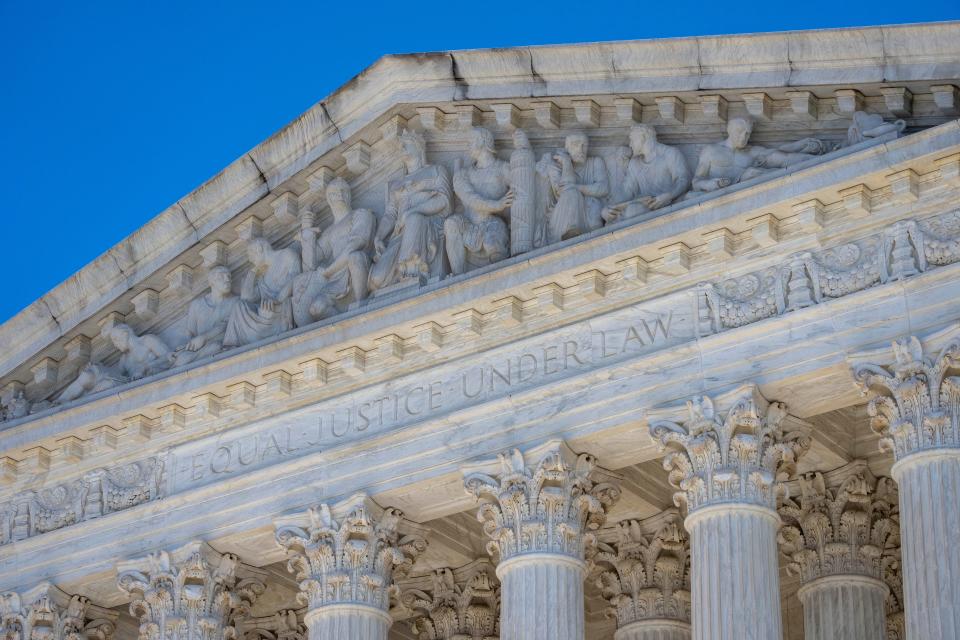Supreme Court sides with 12-year-old transgender girl fighting West Virginia's sports ban
- Oops!Something went wrong.Please try again later.
WASHINGTON – The Supreme Court on Thursday sided with a 12-year-old transgender girl who is challenging a West Virginia ban on transgender athletes joining girls sports teams, temporarily blocking the state from enforcing the prohibition.
West Virginia officials approved the prohibition in 2021. The law requires public schools to create sports teams based on sex assigned at birth. A middle school student who competes on girls' cross-country and track-and-field teams and her family sued in federal court, asserting that the state's ban violates the Constitution and federal law.
The court denied the state's request to temporarily revive the ban while the underlying litigation continues without explanation, as it often does in emergency cases. Justices Samuel Alito and Clarence Thomas dissented from that decision.
"Among other things, enforcement of the law at issue should not be forbidden by the federal courts without any explanation," Alito wrote, referencing a lower court's decision to halt enforcement of the law, which was also done without explanation.
Officials in Alabama, Arkansas, Tennessee and other states have enacted similar laws. Here's a look at what's next for the transgender sports case at the Supreme Court.
What to know about the West Virginia transgender sports case at SCOTUS
West Virginia passed a law in 2021 barring transgender girls from playing on school girls' sports teams from middle school through college. Becky Pepper-Jackson, a 12-year-old transgender girl who currently competes on her school's cross-country and track-and-field teams sued, alleging the prohibition violates the Constitution.
A federal district court sided with the state in February, ruling that officials appeared to be "permitted to use biology as the sole criterion in separating school athletic teams." But the Richmond-based U.S. Court of Appeals for the 4th Circuit essentially put the lower court's ruling on hold in late February, allowing Pepper-Jackson to try out for the teams. The state appealed the decision to the Supreme Court.
West Virginia officials asked that the Supreme Court allow it to continue to enforce the ban while the underlying case works its way through the lower courts.
Ballfields to bathrooms: Many transgender cases pending in court
Pepper-Jackson's case, West Virginia v. B.P.J, is one of several dealing with school sports bans for transgender students.
A federal appeals court in New York is set to rehear a closely watched challenge to a policy in Connecticut that allows transgender girls to compete on girls' sports teams. The plaintiffs say the policy "actively harms female athletes." A three-judge panel of the court in December sided with the state's high schools on narrow grounds. The full appeals court will hear arguments in the case in June.
Thomas: Clarence Thomas accepted luxury gifts from GOP megadonor for decades without disclosing them: report
Roundup: Transgender athlete ban one of many LGBTQ fights brewing in courts
Case tracker: A look at the key cases pending before the Supreme Court
Other courts, meanwhile, are considering policies dealing with school bathrooms. A federal appeals court in December backed a Florida school district's policy banning transgender students from using bathrooms that match their gender identity. The 7-4 opinion reached a different conclusion from an appeals court in Virginia considering a similar policy – creating a split among courts that may entice the Supreme Court to review the issue.
Advocates are awaiting a decision from the Virginia-based U.S. Court of Appeals for the 4th Circuit about North Carolina's exclusion of coverage for gender affirming treatment in the state health insurance plan for government employees.

The big picture
The Supreme Court last debated transgender rights in 2019, ultimately siding with three employees who were fired because of their sexual orientation or gender identity.
A 6-3 majority ruled in 2020 that when the Civil Rights Act of 1964 bars workplace discrimination on the basis of "sex," that also covers sexual orientation and gender identity.
But the nation's highest court has since passed on a number of high-profile appeals. In 2021, the court declined to take up a case about school bathrooms. At issue was a Virginia policy that required transgender students to use unisex bathrooms. Gavin Grimm, a transgender man who was denied access to the boys’ bathroom when he was a student, sued over the policy. By not taking the case, the Supreme Court let stand a ruling from an appeals court in Virginia that found the policy was discriminatory.
Months later, the court declined to hear a dispute between a transgender man, Evan Minton, and a Catholic-affiliated hospital that denied him a hysterectomy. The decision left in place a lower court ruling that permitted Minton to continue his case.
This article originally appeared on USA TODAY: Supreme Court sides with transgender girl fighting WV sports ban

